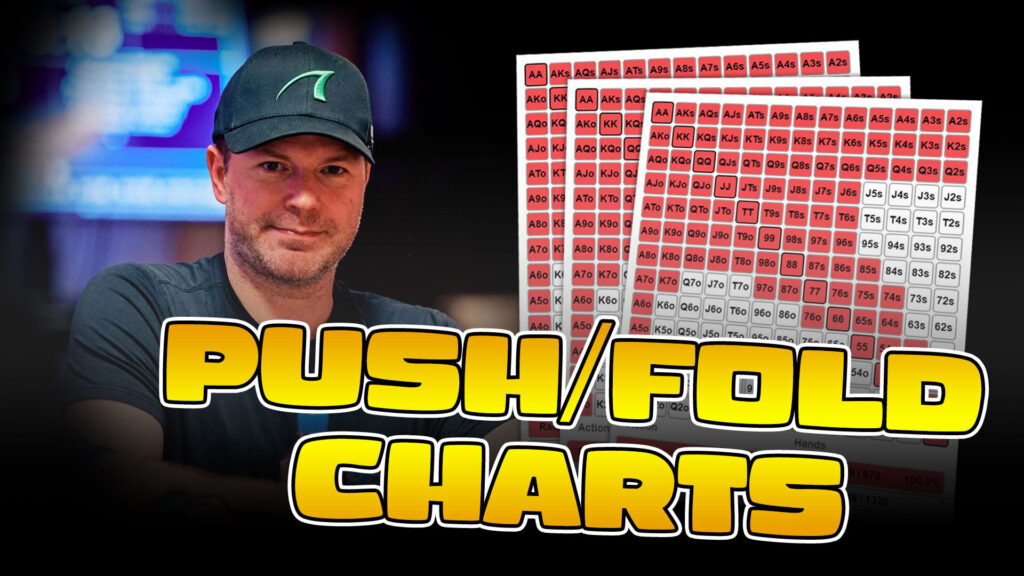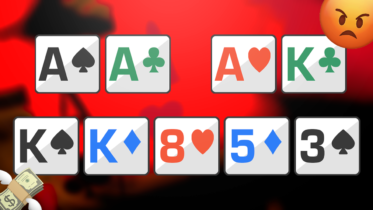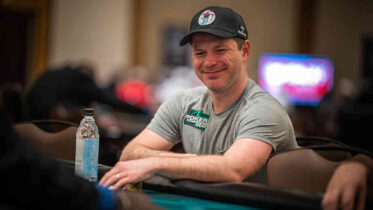This is the first of many articles that will draw from the PokerCoaching Discord server. If you haven’t spent any time there, I encourage you to come visit us. There are a lot of cool people – I recently met somebody with whom I share a dear (but sadly, departed) friend. We have interesting discussions that are often educational. And we have cookies.
There was recently a post in the Cash Games and Strategy channel on the PokerCoaching Discord server. It was called “Just venting.” As all poker players do from time to time, the original poster (“OP”) was experiencing a series of bad poker results. He described the general outline of his issues, and then wrote,
“Anyway, I just needed to get that off my chest to a group of people who probably know where I’m coming from. It’s not quite the same talking to my wife when she doesn’t play the game.”
I immediately checked out of this thread, and didn’t return to it until it came time to write this piece. I wasn’t surprised to see that the first response included,
“Anyway, since misery loves company, here’s a few hands from just today that were super frustrating…”
It was all I could do to keep reading, just so I could gather some material for this article. You see,
I will never again let the toxicity of sad poker tales seep into my life and my soul.
More broadly, I’m avoiding life toxicity in general. But this is a poker blog, and poker is a rich hummus for, well, misery seeking company. This is not an attack on either the original poster or the first person who replied. Almost all poker players want to share their tales of woe – bad beats, bad variance, not enough value for their big hands – the list is endless.
Decades ago, I was moderately famous for charging poker players $1 to listen to their bad beat story. And I was good at it – I would nod at the appropriate times, make sympathetic noises, the whole thing. As I became older and wiser, I realized that this was a terrible bargain for me. For effectively zero money, I was letting all that bad energy and those downer vibes into my world.
Here’s the deal: if you are a poker player (or a human being) you have experienced bad beats. The poker ones, they all collapse into a relatively small number of isomorphic events that we’ve all experienced hundreds of times. So when you tell me your story, I’m not hearing anything I haven’t heard – and experienced – before.
Furthermore, it’s not really going to make you feel any better. You’re only marinating in the pain that you experienced – it’s not like you’re going to get insight, comfort, or healing out of complaining to me about it.
Whining about bad poker results just extends the pain and gives it agency.
If there is something to be learned from what happened, then by all means, review, study, and grow. But if you got the money in with pocket kings versus pocket jacks, and they found a jack on the turn, forget the hand and move along. Focusing on a previous bad result keeps it in your head and lets it mess around with your mood, your physical comfort, and your future decisions. Bringing it to another person just spreads the pain. Life has enough pain for all of us – if you want to share your pain with another person, do it in a context where the pain is sufficiently important, and the human interaction can actually have a therapeutic effect.

Read one of the highest regarded articles on the PokerCoaching.com blog: The Bankroll Bible
It’s not just me who is rejecting bad beat poker stories
You might think I’m being a curmudgeon – that it is incumbent on all poker players to tolerate bad beat stories from fellow players. Nope, absolutely not. I’ll give you a few references.
Tommy Angelo – Legendary Poker Coach
Let me introduce my friend, musical co-conspirator (thank you for the banjo loan!), and fellow PokerCoaching contributor, Tommy Angelo. Tommy has written about poker since, well, maybe before you were born. Dealing with pain and tilt in poker is right in Tommy’s wheelhouse, so he’s written frequently about it. Here’s a (likely apocryphal) story he tells that goes right to the heart of the matter:
“I have a question for you, Alfonzo,” I said. “What is it that you don’t like about being told bad beat stories?”
“It’s a sensation of, of… rudeness, and embarrassment. As if someone had lifted their shirt to show me a scar. If I wish to view poker scars,” he touched his hat, “I can look under my shirt.”
“If I wish to view poker scars, I can look under my shirt.” Exactly.
I should note that because Tommy has such a long and intimate relationship with pain and tilt in poker, he is also an expert at mitigating it. If you want to seek his counsel on this topic, drop him a note at www.tommyangelo.com/contact/.
Erik Seidel – Poker Hall of Fame Inductee
We would probably never know so intimately about Erik Seidel’s attitude toward bad beat stories were it not for the extraordinary writer Maria Konnikova, and her book, The Biggest Bluff. She managed to get Seidel, a legend of the game, to take her under his tutorial wing. During one of her first trips to Las Vegas, she had a set cracked by a flush in a poker tournament, and went running across the Strip to tell her sad story to Erik.
“Do you have a question about how you played the hand?”
“Well, not really,” I answer. “I mean, I had a set. . . .”
“Then I don’t want to hear it.”
I’m taken aback.
“Look, every player is going to want to tell you about the time their aces got cracked. Don’t be that player,” he continues. “Bad beats are a really bad mental habit. You don’t want to ever dwell on them. It doesn’t help you become a better player. It’s like dumping your garbage on someone else’s lawn. It just stinks.”
Bad beats are a really bad mental habit. You don’t want to ever dwell on them. It doesn’t help you become a better player. It’s like dumping your garbage on someone else’s lawn. It just stinks.
– Erik Seidel
Not only is Erik Seidel one of poker’s all-time greats, but he has a way with words.
Phil Galfond – Three-time World Series of Poker bracelet winner
Shall we round this out with Phil Galfond? Why yes, we’ll finish with arguably the most highly respected person in the game, both as a player and as a role model for poker players. Here’s a Twitter thread that Phil put out at the beginning of 2023. I encourage you to read the whole thread, but here’s the post that particularly stuck with me:
Most humans already deal with “negativity bias.” It’s basically when negative moments stick out in our memory more than positive ones. By whining, I drew even more of my attention to the negative. This negativity bias is not just exclusive to poker, it’s everywhere…
– Phil Galfond

Make the best preflop decisions with Jonathan Little’s Push/Fold Charts!
Instead, choose gratitude
When a new player sits down at my poker table, or I sit down at theirs, somebody will often say, “How’s it going?” or words to that effect. My answer: “I’m sitting in air-conditioned comfort playing a silly card game. I guess I’m doing great.”
This is simply one aspect of an intentional focus on my good fortune, and gratitude for it. But I’ve found that it serves me beautifully as a poker player. Bad beats and bad runouts disappear from my consciousness before they can take root and poison my mood. I convey comfort, ease, and even joy at the table – it terrifies my opponents.
So not for a dollar – or a million dollars – will I let your bad beat story impinge on the joy and gratitude I’m feeling, sitting there in the #7 seat. If I refuse to be drawn into your whining, please understand. In fact, I hope you’ll take it as a cue to improve your perspective: you’re sitting in air-conditioned comfort playing a silly card game.
You have much to be grateful for, and I encourage you to wallow in gratitude for it.
I hope we’ll see you at the PokerCoaching Discord server soon.




